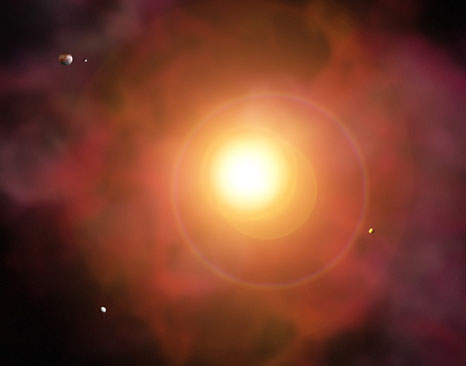Note: This is post #17 in our series on Tafseer of Juz ‘Amma.

We’re going to digress a bit and jump back to Surah Takweer. This post is based on Shaykh Nouman Khan’s tafseer, which heavily emphasizes the Arabic language. I hope you will find, as I found it, as a glimpse of a previously-unseen world, a depth of knowledge that just drips from the Arabic language.
Allah says, in surah Takweer:
إِذَا الشَّمْسُ كُوِّرَتْ
Translation: When the sun is kuwwirat … [verse 1]
There are a lot of gems that we learn even from this first ayah:
- Idhaa + Past-Tense: Idhaa is an indicator of future-tense “when (something will happen).” Yet, kuwwirat is past-tense; why? This combination means something is so certain, it’s like past-tense. So Allah is saying “when this happens,” yet it’s certain that it WILL happen; as certain as the past is past.
- Nominal Sentence: The default in Arabic is to put the verb first–“kuwwirat ash-shamsu.” To reverse this into “ash-shamsu kuwwirat,” shows emphasis, and makes it a tougher, stronger sentence. This hints at the audience–Mushrikeen in Mecca, the worst and most obstinate of them, who are listening to this revelation.
- Passive Voice: Allah could have said, “When I wrap up the sun,” but He didn’t. Why? If you’re biased against someone (say a political party), no matter what they say, even before they open their mouth, you say, “psshh.” But here, passive-voice highlights the maf’ool, the recipient of the action–the sun, the stars–instead of the doer.
As for the meaning of kuwwirat, kawwara means to wrap something around something; it’s used in the context of a turban, something long, that’s wrapped around your head.
Allah is applying the same meaning here–that the light of the sun, something that’s long, will be kuwwirat, wrapped up. Wrapped up meaning, something will cover it, and it will no longer be visible; and it will be wrapped slowly, part by part disappearing–the same way that Allah described the day as wrapping around the night and the night wrapping around the day.
This is something scary–that you see the sun wrapped up, and losing its light. But there’s more …
وَإِذَا النُّجُومُ انكَدَرَتْ
Translation: And when the stars are inkadarat … [verse 2]
Inkadarat is an interesting (past-tense) verb; the masculine singular is inkadara (in case you’re wondering). Inkadara has two shades of meanings–one is to lose colour. So the way that you see the stars, they will lose their colour and fade out; and the second meaning is to fall–fall, like shooting stars. So the stars will fade away, and they will fall …
And between these two–the sun, the most prominent feature of the day, and the stars, the most prominent feature of the night–when they fade away and are blacked-out, that’s something very serious and very frightening.
But there’s more …
وَإِذَا الْجِبَالُ سُيِّرَتْ
وَإِذَا الْعِشَارُ عُطِّلَتْ
Translation: And when the mountains are removed (meaning, when they move, like water moves), And when full-term she-camels are neglected, … [verse 3-4]
Mountains are like pegs. They never move. Ever. Not in a million years … but one day, they will move.
And the she-camel? This is the pregnant she-camel at ten months–right before it gives birth (‘ishaarah, from ‘ashara, ten); this is the point where it gives birth, and WHAM, that’s like $3000 right there, when your investment bears fruit.
And when the pregnant she-camels, that symbol of money, are neglected and useless. Like someone leaving their jewelry store unlocked and running away.
What would make a person do that?
وَإِذَا الْوُحُوشُ حُشِرَتْ
Translation: And when the wild beasts are gathered … [verse 5]
Hushirat means gathered; just like jam’aa; but here, hushirat means herded together, gathered by force. If you’ve ever seen like a huge flood, you might see two animals who are at each other’s necks normally, scrambling together on this little piece of land. They don’t even look at each other! What would make wild animals do that?
وَإِذَا الْبِحَارُ سُجِّرَتْ
وَإِذَا النُّفُوسُ زُوِّجَتْ
وَإِذَا الْمَوْءُودَةُ سُئِلَتْ
بِأَيِّ ذَنبٍ قُتِلَتْ
Translation: And when the seas are filled with flame, and when the souls are paired (good with good people and bad with bad people), and when the girl [who was] buried alive is asked, for what sin she was killed? … [verses 6-9]
Arabs at the time of the Prophet (salallahu alayhi wa sallam) used to bury their daughters alive, because she would bring shame to her family. They would either do one of two things: the woman would go out, in labour, to a pre-dug grave; and if it’s a girl, throw her in right away and bury her. Or they might wait a few years, take her out to the middle of the desert, and get her to help dig the grave, then throw her in it and throw dirt on her.
And nobody would stand up for this little girl; yet Allah is asking her, speaking on her behalf, defending her. Think about this:
- She commited no sin. Yet she will be asked. So what of the one who killed her?
- Allah is not even SPEAKING to the murderer. They are not even worth talking to. Instead, He asks the victim.
- This little girl, who had nobody to defend her, has Qur’an revealed in her favour. Until the end of time.
This same jahil culture exists today (to a lesser extent, from what I know) in many, many cultures–they celebrate the boy’s birth, but are disgraced, disappointed, you name it, if it’s a girl.
And this act is put on the same scale as the destruction of the Earth at the end of time. That’s how serious it is.
وَإِذَا الصُّحُفُ نُشِرَتْ
وَإِذَا السَّمَاءُ كُشِطَتْ
وَإِذَا الْجَحِيمُ سُعِّرَتْ
وَإِذَا الْجَنَّةُ أُزْلِفَتْ
عَلِمَتْ نَفْسٌ مَّا أَحْضَرَتْ
Translation: And when the pages are made public, and when the sky is stripped away, and when Hellfire is set ablaze, and when Paradise is brought near, every soul will [then] know what it has brought [with it]. [verses 10-14]
Verse 14 is the answer to the idhaa. Every soul will know what it ahdarat.
Ahdarat is an interesting word; it has connotations of:
- Remember everything. The person will remember, in vivid, vivid detail, everything that they did. Everything. Big or small.
- Uncomfortable? It will be a remembering by force; like a person giving a presentation in front of other students in class, or in front of managers–not the most comfortable situation, and to some degree, forced.
What they sent and what they left behind. In the next surah, Surah Intifaar, Allah does tafseer of this ayah and mentions what souls sent forth, and what they left behind; sent forth, the way you send an email–it’s sent, and it’s done; and left behind?
There are two cases of leaving-behind: either it was something good–there was a fundraiser at a masjid, you had cash in your pocket or bank account, and you didn’t donate–that’s a deed you could’ve done, but left behind.
Or, your friends called you to go to the bar with them. Or you wanted to eat that delicious, roasted pork; but you didn’t. That’s a deed you could’ve done, but left behind. And you’ll be happy you did.
This is just a glimpse of the power of the Arabic language of the Qur’an, a mere drop in the proverbial ocean of knowledge. If you want more of this, check out Bayyinah’s live tafseer of Juz ‘Amma lectures , live every Wednesday at 8pm EST; or, you can listen to the recordings, available for free.
May Allah (subhannahu wa ta’ala) give us the tawfeeq to understand this great, great message that we’re getting–ameen ya rabbal alameen.
One other note–you’ll notice that all these verses rhyme; this is a consistent theme in the Qur’an, one technique that indicates that all these verses are related–one discourse. This is something you’ll never, ever get from any translation.
Wallahu ta’ala ‘alam.
References:
- Tafseer of Surah At-Takwir. By Nouman Ali Khan – Bayyinah Institute
- Touched by an Angel: Tafseer of Juz ‘Amma. By Muhammad Alshareef. 2009.
